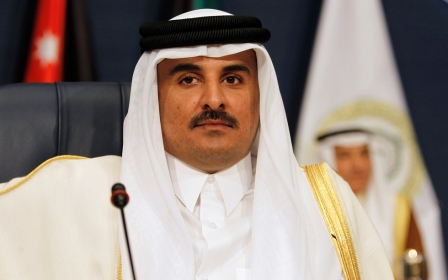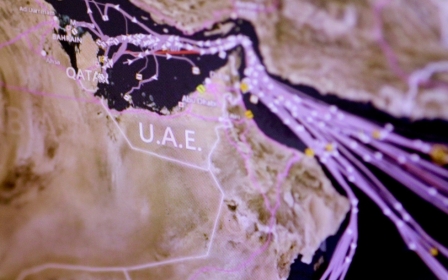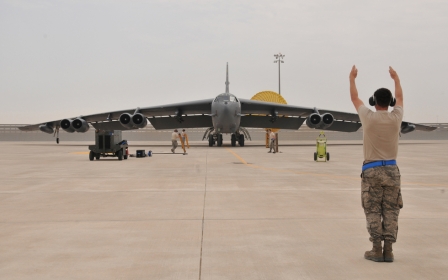Most Turks root for Qatari underdogs as own divides resurface
Support rallies, Twitter hashtags, hundreds of column inches announcing unwavering and unconditional backing… the tiny Gulf state of Qatar appears to have found an unlikely ally in the Turkish people, at least among its conservative and Islamist populace.
For many of these Turkish supporters of Doha it is not ideological affiliation or being coreligionists that is behind their backing. It is rooting for an underdog they feel is being targeted disproportionately and unfairly.
Led by Saudi Arabia, the United Arab Emirates, Bahrain, Egypt and a few other countries on Monday severed relations with Doha, accusing it of supporting "Islamist militants" and their arch-foe Iran - charges Qatar says are baseless. They have also placed the country under a blockade, cutting off all air and land routes to the country.
'If we don’t take a stand and support Qatar it will be our turn next'
- Muhsin Onder, supermarket employee
The fact that this siege came shortly after a visit to Saudi Arabia by US President Donald Trump has infuriated some Turks who see hidden hands behind the Saudi-led assault on Doha.
Images that emerged from Trump’s visit to Saudi Arabia such as his doing a sword dance and peering over a glowing globe alongside the Saudi king and Egyptian president have done little to dispel perceptions that the attack on Qatar was a well-coordinated move done at Trump’s bidding.
Nezih Senocak, a petrol station attendant in Istanbul, is happy that the Turkish government is backing Qatar and wants to see even more done in support.
“This shows clearly that the Saudis do the bidding of the Americans and Israelis. A $110bn weapons deal gets you permission to destroy your rival. What do they care if it is during the holy month of Ramadan,” said Senocak. “I am happy our president is supporting Qatar. We must do whatever we can to help them.”
Turkish President Recep Tayyip Erdogan has made it clear that his government will not abandon Doha, even saying that “ties with Qatar would be developed further”.
Military base and domestic opposition
On Wednesday, Turkey’s parliament ratified a 2016 military agreement between the Turkish and Qatari government to set up a joint military base in Qatar to combat common threats and train Qatari forces.
It now needs to be signed by Erdogan before it becomes law.
The timing of the Turkish parliament’s passing of the bill is a significant symbolic show of support for Qatar, while also legally protecting the Turkish government if anything were to happen to the few hundred Turkish troops already stationed there.
The possibility of Turkey deploying more troops to Qatar other than routine deployments or any change in their roles appears slim.
The Qatar crisis has also resulted in the exposure of one of Turkey’s traditional fault lines of whether Turkey should be westward or eastward looking and with whom it should associate itself.
The opposition Republican People’s Party (CHP) has opposed the bill, with one of its MPs even calling it a betrayal of Turkish soldiers.
Eren Erdem, a CHP MP from Istanbul, wrote: “Mehmetcik (endearing Turkish term used for soldier] becomes Qatari emir’s bodyguard. The parliament members who took this decision signed off on a historic shame. Sad! The state we have been reduced to!”
The CHP and its supporters claim Erdogan and the government’s backing for Qatar is not based on national interests but instead on personal ones. Its MPs say backing Qatar will only result in Turkey being isolated too.
The CHP is often accused of being statist and pro status quo both at home and in international affairs. The party’s response to the Arab Spring, as it unfolded, was to back existing regimes and is believed to be mostly based on opposition to the stance of the ruling Justice and Development Party (AKP).
However, some political observers and commentators have also warned that Ankara should not base any decision regarding Qatar purely on ideological and personal reasons. They say the stakes are high and Turkey needs to think twice before opposing Riyadh and Washington.
Ceyda, 38 and a Kemalist, was enraged that Turkey was even being mentioned in this debate.
'Why should this even concern us? Let the Arabs go at each other’s throats. We are not Arab. We are a modern secular country and nothing like them'
- Ceyda, Istanbul resident
“Look at what they (the AKP] have done to us. Why should this even concern us? Let the Arabs go at each other’s throats. We are not Arab. We are a modern secular country and nothing like them,” she said.
Muhsin Onder, an employee at a supermarket, said he was opposed to the Saudis, rather than feeling inclined to back Qatar. He is also worried Turkey might be targeted by Saudi Arabia and her allies next, as many pro-government media outlets have reported.
“I don’t know how the Saudis can call themselves Muslim and behave like this. If there is a problem they could sit down and discuss it. I don’t know anything about Qatar but it is not right for a small country to be attacked like this,” said Onder. “I also think if we don’t take a stand and support Qatar it will be our turn next.”
On Wednesday night, a few dozen people gathered in Istanbul’s Taksim Square after the nightly Ramadan prayer to announce their solidarity with Qatar.
Although numbering just a few dozen, the gathering was noteworthy because it was in support of another country. There are few, if any, instances of people taking to the streets to show support for other nations, apart from occasional small-scale demonstrations in support of Palestinians.
A twitter hashtag created on Monday #Kataryalnizdegildir (Qatar is not alone) has also proved quite popular.
The very possibility that these demonstrators were able to gather in Taksim Square without police interference is also something that angers the government’s critics.
Holding demonstrations and protests without an immediate and harsh police response has almost become an impossibility in Turkey in recent years, especially after a state of emergency was declared last July.
Trustworthy ally
Qatar remains the most steadfast ally in the Gulf for the Turkish government. Over the last decade the two countries have developed extensive relations, including financial ones which are crucial for Ankara.
Turkey’s ties with Saudi Arabia and the UAE soured after they backed different sides in Egypt. Ankara refuses to endorse Egyptian President Abdel Fattah El-Sisi, who seized power from Mohamed Morsi, the country's first elected president.
Ankara restored its ties with the Saudis after the incumbent King Salman took over. Its ties with the UAE remain strained.
A bonus for Turkish support for Doha is a share of Qatar’s estimated $5.5bn annual food imports.
However, pro-government Turkish media was reporting the launch of a Twitter campaign by some Saudis seeking a boycott of Turkish goods over Ankara's continued support for Qatar.
Erdogan has already instructed his economy minister to take requisite measures to capture a bigger slice of the Qatari market as the peninsula looks to address its food needs as a result of the siege.
Senocak, the petrol station attendant, sees it as a win-win situation.
“We get to help our Qatari friends and it is good for our own economy. Everyone wins.”
Stay informed with MEE's newsletters
Sign up to get the latest alerts, insights and analysis, starting with Turkey Unpacked
Middle East Eye delivers independent and unrivalled coverage and analysis of the Middle East, North Africa and beyond. To learn more about republishing this content and the associated fees, please fill out this form. More about MEE can be found here.




